|
July 23, 2020 - No. 50
Use of Pandemic as Excuse to Trample Workers' Rights
All Out to Stand Up for the Rights of All!

• Say NO! to Ontario Bill 195
- Steve Rutchinski
Workers Speak Out
• Union Press Conference Demands Withdrawal of Ontario Bill 195
• Quebec's Ministerial Orders Are Unacceptable
- Interview, Benoît Taillefer
Use of Pandemic as Excuse to Trample Workers' Rights
  
Governments across the country are engaging in
unacceptable self-serving activities under the cover of the pandemic.
While the working people have taken a clear stand against returning to
"business as usual" -- a state of affairs that continues to worsen the
pandemic -- governments are using the situation to take away any voice
the working people have. Already, the push for profit-based health care
has led to a disproportionately high number of deaths due to COVID-19
in private long-term care homes with deplorable conditions. For
example, CBC reported in June that 82.5 per cent of deaths in long-term
care homes in eastern Ontario have been in for-profit facilities.
Already, the anti-social offensive, pay-the-rich schemes and impunity
pushed by governments for the past 20 and more years has caused utter
deterioration of the social conditions.
When the ruling class started pushing the anti-social offensive they
arrogantly declared that it would lead to prosperity. All the measures
they have taken have made the rich richer and the poor poorer and
usurped more and more powers into the hands of narrow private
interests. Privatization, the elimination of all traces of the social
welfare
state and "changes to fiscal and budgetary policy" were accompanied by
attacks on unions and all arrangements from the past whereby workers
could negotiate wages and working conditions and security during
illness, injury and retirement. The arrogance is such that the working
people are not included in any discussion about the direction of the
economy or social, political and cultural policy and affairs. The
political system which claims they have representation through the
election of political parties to form governments has no credibility or
legitimacy because the people control no aspect of the electoral system
-- from who is selected to represent them and use their name to adopt
and
carry out policies, to what policies are adopted, to any decisions made.
This is the heart of the matter which reveals the need for political
renewal. It is thanks to the fight of the working class against
government fraud, corruption and cynical claims that the people still
have any measure of security. The use of the pandemic as a pretext to
justify emergency police powers is reprehensible. The working people
must
unequivocally condemn this and put an end to it.
Governments in Quebec, Ontario and Alberta are declaring and
implementing serious anti-social measures, using the pandemic to give
themselves all kinds of powers in the name of the greater good and
restoring the economy. Working people are entitled to be consulted and
participate in setting the direction of the economy and being an
integral, equal part of any decisions taken because they affect them,
their lives and those of their families in every way.
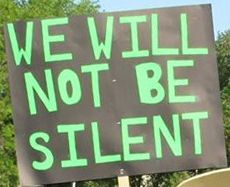 It
is time to reject all claims that such legislative changes are
constitutional or can be made constitutional or acceptable if a
mythical system of checks and balances prevails. There are no "checks
and balances" within the realm of government dictate. There is the
striving of the rich to control everything and the heroic efforts of
the working
people and their organizations to hold them in check. But the division
of the society between those who have usurped power through corruption,
fraud and force and those who are supposed to submit without resistance
is at the heart of the anarchy, chaos and violence in the form of the
most heinous injustices and abuses of all kinds which prevails
today. It
is time to reject all claims that such legislative changes are
constitutional or can be made constitutional or acceptable if a
mythical system of checks and balances prevails. There are no "checks
and balances" within the realm of government dictate. There is the
striving of the rich to control everything and the heroic efforts of
the working
people and their organizations to hold them in check. But the division
of the society between those who have usurped power through corruption,
fraud and force and those who are supposed to submit without resistance
is at the heart of the anarchy, chaos and violence in the form of the
most heinous injustices and abuses of all kinds which prevails
today.
Everyone must speak out against the use of emergency police powers
for criminal self-serving aims of paying the rich. No to Ontario Bill
195, the Reopening Ontario (A Flexible Response to COVID-19) Act, 2020, which empowers Cabinet to make temporary orders adopted during the COVID-19 state of emergency permanent. No to
Quebec Bill 61, An
Act to restart Québec's economy and to mitigate the consequences of the
public health emergency declared on 13 March 2020 because of the
COVID-19 pandemic; and Alberta Bill 10, the Public Health (Emergency Powers) Amendment Act, 2020, which seek to do the same thing.
The situation facing the working people has become a
battle for
democracy where all egregious anti-democratic measures must be
rescinded, as well as a battle of democracy in which the working people
must vest the decision-making power in themselves. This starts by
taking a stand against what is unacceptable, speaking out, deciding
what
measures can be implemented at any time to resolve the crisis in their
favour and setting a new direction for the economy. The working people
cannot afford to be merely reactive to every attack launched against
them but must also learn to be pro-active. Those who are arrogantly
using their positions of power and privilege to do all the things which
cause such damage to society and the people must be removed, not be
replaced by more of the same but by the working people themselves.
Defeat Anti-Workers Anti-Social Legislation!
No the "Emergency Powers"!
The Time to Act Is Now!

- Steve Rutchinski -
On July 7 the government of Ontario introduced Bill 195, the Reopening Ontario (A Flexible Response to COVID-19) Act, 2020,
to empower Cabinet to extend temporary orders issued during the
COVID-19 state of emergency, once the emergency is lifted. The majority
of orders issued override in one way or another the collective
agreements of workers, especially front-line health care workers in
hospitals, long-term care homes, retirement homes and so on. But the
reach of the bill extends far beyond these workers, to include people
working for boards of education, social services, water systems and
sewage works and more.
Bill 195 passed second and third reading on July 21,
then received Royal Assent the same day. The new law will come into
force on a day to be proclaimed by the Cabinet. It is yet one more
expression of the anti-social offensive that is destroying the social
fabric of our society, just as Bill 124 enacted last year imposed a
three-year wage freeze on all public sector employees in Ontario.
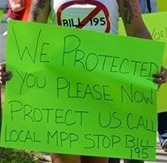 Bill 195 will formally end the state of emergency but allows the emergency orders issued under the Emergency Management and Civil Protection Act
(EMCPA) to be continued by decree of the Lieutenant Governor in Council
(i.e. the provincial Cabinet). Whereas under the EMCPA emergency orders
had to be re-approved every 14 days, under Bill 195 they can be renewed
by Cabinet for 30-day periods, for up to one year, and the powers of
the bill can be extended for a further year. Orders may also be amended
to apply to additional persons or groups. Bill 195 will formally end the state of emergency but allows the emergency orders issued under the Emergency Management and Civil Protection Act
(EMCPA) to be continued by decree of the Lieutenant Governor in Council
(i.e. the provincial Cabinet). Whereas under the EMCPA emergency orders
had to be re-approved every 14 days, under Bill 195 they can be renewed
by Cabinet for 30-day periods, for up to one year, and the powers of
the bill can be extended for a further year. Orders may also be amended
to apply to additional persons or groups.
The bill also comes with harsh enforcement provisions, although it is unclear how they will be interpreted and implemented.
Information pickets sprang up almost immediately
condemning this
attack on workers' rights. Workers and their unions are discussing how
to respond. Michael Hurley, President of the Ontario Council of
Hospital Unions/Canadian Union of Public Employees (OCHU/CUPE), which
represents 50,000 hospital workers, held press conferences in
North Bay, Sudbury and elsewhere to inform and call on the public to
stand with the workers against Bill 195. The Ontario Nurses Association
(ONA) has held two online information sessions engaging thousands of
their members in discussion on the implications of Bill 195 for nurses
and patients. Service Employees International Union
Healthcare (SEIU Healthcare), which represents 60,000 front-line
workers in Ontario condemned Bill 195 as "a gift to the for-profit
long-term care industry to override the collective agreement by
enabling more shifts to newer, lower-paid workers."
Other union organizations like Unifor, the United Food and
Commercial Workers Union (UFCW) and the Ontario Federation of Labour
(OFL) have also strongly condemned the actions of the Ford government.
The Canadian Civil Liberties Association (CCLA) described Bill 195 as
an "undemocratic power grab" and called on Ontario MPPs to
resist it.
 "In
essence, Bill 195 would give the Premier and Ministers the power to
impose emergency orders that drastically curtail basic rights and
freedoms without the need to engage in the legislative process or
involve members of the Legislative Assembly," the CCLA said. It opposed
the fact that the special powers "would last for at least a year and
can be extended by the Legislative Assembly for a year at a time.
Indefinitely. The powers governments have under emergency legislation
are supposed to be exceptional -- Bill 195 would make the exercise of
those powers the 'new normal.'" "In
essence, Bill 195 would give the Premier and Ministers the power to
impose emergency orders that drastically curtail basic rights and
freedoms without the need to engage in the legislative process or
involve members of the Legislative Assembly," the CCLA said. It opposed
the fact that the special powers "would last for at least a year and
can be extended by the Legislative Assembly for a year at a time.
Indefinitely. The powers governments have under emergency legislation
are supposed to be exceptional -- Bill 195 would make the exercise of
those powers the 'new normal.'"
The powers at the disposal of the Premier and the Cabinet under the EMCPA are considerable, including the power to issue
orders deemed "necessary and essential in the circumstances to prevent,
reduce or mitigate serious harm to persons." No information or
assessment is provided as to whether the government in fact did
anything "to prevent, reduce or mitigate serious harm to persons" or
what precisely it has done and the consequences to the people of
Ontario.
Most of the emergency orders issued under the current COVID-19
pandemic emergency state explicitly that despite the existence of any
collective agreement, employers set staffing priorities and may
unilaterally redeploy staff as required, change work schedules or shift
assignments, cancel vacations, hire part-time, temporary or contractor
labour and use volunteers to perform bargaining unit work. Grievance
procedures are suspended for any matter referred to in the order.
This has no intention other than trampling underfoot the
role the unions play on all these fronts. The fact that unions have
cooperated every step of the way to make sure the population is
protected is ignored as is the fact that it is the workers who know
what is required at their places of work so that everyone is
protected. There is no legitimate justification of any kind for
these special powers.
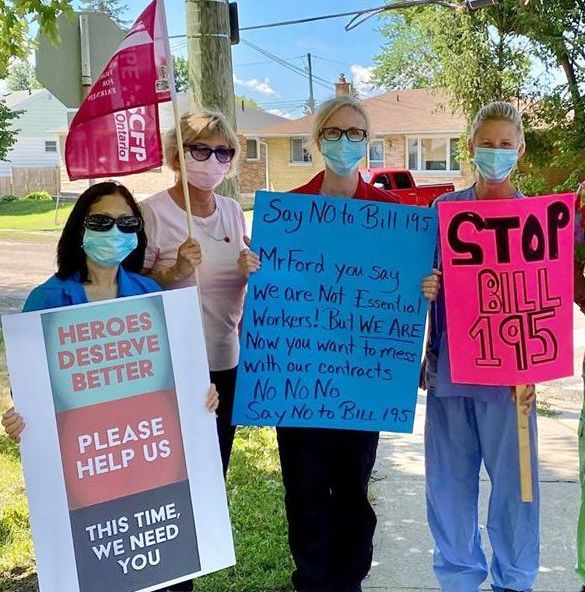 It
never was the case that the terms and conditions of work set out in
collective agreements put anyone at risk of "serious harm." Health care
professionals and workers from the outset have gone above and beyond
the call of duty, put their lives on the line, to care for the sick and
elderly. The working conditions of health professionals and
workers are in fact the living conditions of the elderly and those in
need of care in our society. It
never was the case that the terms and conditions of work set out in
collective agreements put anyone at risk of "serious harm." Health care
professionals and workers from the outset have gone above and beyond
the call of duty, put their lives on the line, to care for the sick and
elderly. The working conditions of health professionals and
workers are in fact the living conditions of the elderly and those in
need of care in our society.
The COVID-19 pandemic revealed what the workers have been saying all
along, that privatization, cut backs in service, degradation of wages
and working conditions of health care workers, hiring of casual,
part-time labour, and the entire fend-for-oneself approach has caused
serious harm to society. It has been an unmitigated disaster for our
elderly in long-term care and generally left the population vulnerable.
To override collective agreements during the pandemic state of
emergency did nothing to "alleviate the risk" for anyone, least of all
the health care workers or those receiving care. The fact that this is
used to undermine the fight of unions to stop the deterioration of
workers'
conditions of employment and the ability to negotiate these is
straightforward fraud, corruption, and abuse of power.
Every day of this pandemic, front-line workers have been fighting to
keep themselves and the public safe. Workers must continue to speak out
in defence of their rights, against this anti-social offensive and for
a new human-centred direction for society. It is by laying the claim to
what belongs to all by right that a "new normal" which serves
society will be brought into being.

Workers Speak Out
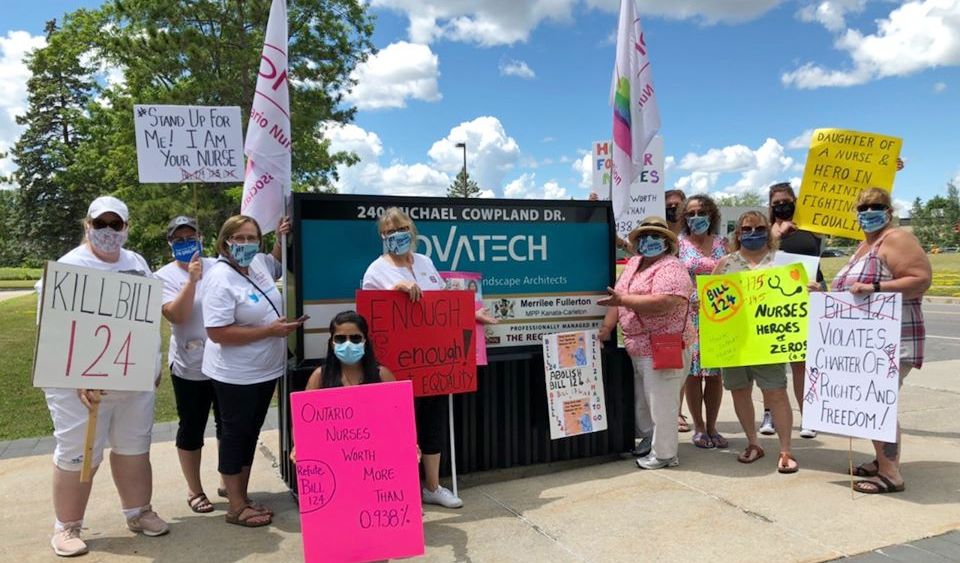
Nurses demand the repeal of Bill 124, which imposed a three-year wage freeze on all public sector workers in Ontario.
On July 21, Michael Hurley, President of the Canadian Union of
Public Employees' Ontario Council of Hospital Unions (OCHU/CUPE) and
Steven Barrett, a labour lawyer with Goldblatt Partners addressed a
press conference called to highlight the impact of Bill 195 on hospital
workers' rights and to demand that the bill be withdrawn. The
excerpts below are taken from the remarks Hurley made in response to
questions from the media, including Workers' Forum,
about the impact of the bill and the union's determination to force the
government to withdraw the bill through the workers' mass struggle.
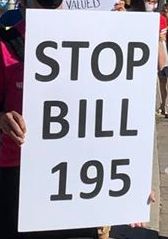 "This
bill gives employers across the health care sector the right to act
unilaterally. An employer does not have to pay any attention to the
collective agreements that are in place. It can move you from your job
to another job, from the shift you are on to another shift. It can lay
you off without notice. It could bring in someone else to do your
work from outside. It could contract [out] that work. It could cancel
all leaves and vacations and of course one of the significant things is
it can do all that whether it has COVID cases or not. All of the health
care employers are empowered under this legislation to operate without
regarding the rights that exist in the contract even though most
hospitals and most long-term care facilities in Ontario have no COVID
cases. And this continues for a period of a year [and is] renewable --
could be two years, could be three years. What we have said to the
government is 'Look, if you have another outbreak of COVID, or Ebola or
typhoid, you've got to believe that, as we were in March, we
are going to be flexible. But setting permanent suspension of our
rights is not acceptable.' "This
bill gives employers across the health care sector the right to act
unilaterally. An employer does not have to pay any attention to the
collective agreements that are in place. It can move you from your job
to another job, from the shift you are on to another shift. It can lay
you off without notice. It could bring in someone else to do your
work from outside. It could contract [out] that work. It could cancel
all leaves and vacations and of course one of the significant things is
it can do all that whether it has COVID cases or not. All of the health
care employers are empowered under this legislation to operate without
regarding the rights that exist in the contract even though most
hospitals and most long-term care facilities in Ontario have no COVID
cases. And this continues for a period of a year [and is] renewable --
could be two years, could be three years. What we have said to the
government is 'Look, if you have another outbreak of COVID, or Ebola or
typhoid, you've got to believe that, as we were in March, we
are going to be flexible. But setting permanent suspension of our
rights is not acceptable.'
"We have to take into account the price the workforce has paid
already in terms of the failure of the provincial government to provide
them with adequate protection. This is the case and, to put it in
context worldwide, the rate of infection of health care workers' cases
relative to public cases of COVID is about six per cent worldwide
versus
17.4 per cent in Ontario, which is about three times greater. Despite
that, people have gone to work, and they have provided care and they
have put themselves at risk and they have been quite appropriately
applauded for that -- and they can be trusted, they can be counted on.
We are asking the government to trust them, to trust that if there is
another outbreak they will come through for people as they did before.
"There will be a legal challenge against the bill. But we are hoping
to get the government to move before this gets to court. We are going
to do our best to achieve that.
"We are going to be organizing, and we won't be alone. We hope to do
it with other unions, regional rallies that respect social distancing
and provincial demonstrations. We have the support of the Federation of
Labour and of the labour councils in Ontario. We are going to be asking
people to help us to pressure the government, to support our
email and other efforts on social media to distribute our message and
to participate in all of our protests. I am really hopeful that
together we can be very effective."
On behalf of the law firm Goldblatt Partners, Steven Barrett
explained OCHU/CUPE's two-fold legal argument for the withdrawal of
Bill 195. First, the bill violates several Supreme Court of Canada
rulings which uphold the right to collective bargaining on the
basis of
the Charter right of association. He added that
the
fact that Bill 195 explicitly says that the COVID-19 emergency is over
deprives the government of the legal argument to invoke the emergency
to justify violating collective bargaining rights. Secondly, Bill 195
follows Bill 124, the Protecting a Sustainable Public Sector for Future Generations Act, 2019that
the government enacted in 2019,
prior to the pandemic, which limits compensation increases for public
sector workers to one per cent per year for a three-year period. One
of the realities that COVID-19 has made even clearer than before,
Barrett said, is the fact that the CUPE workers that OCHU represents
are paid too little. Yet Bill 124 prevents them, for a three-year
period, from negotiating
appropriate compensation that recognizes the essential critical nature
of the services they provide, before and during the pandemic. He said
that Bill 195 compounds the unconstitutional attack that started with
Bill 124.

- Interview, Benoît Taillefer -
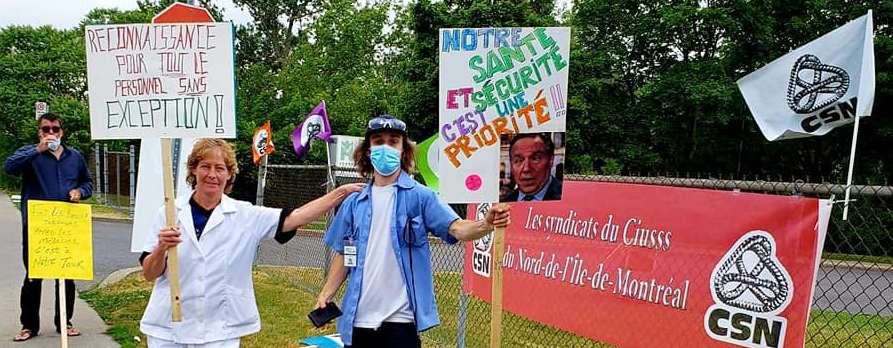
Picket at Rivière-des-Prairies hospital in Montreal, June 29, 2020.
Benoît Taillefer is Vice-President, Occupational Health and
Safety for the Workers' Union of the Integrated University Health and
Social Services Centre, Montreal North.
Workers' Forum: Your members are required, by
ministerial order, to train thousands of new orderlies who are
receiving far less than the normal hours of education. What is the
situation now with the new orderlies doing their internship in the
residential and long-term care centres (CHSLDs)?
 Benoît Taillefer:
First of all, I must say that I have absolutely no problem with people
coming to join us and that they are paid good wages. At the same time,
there are people who have been here for a long time, who see new people
coming in who have not had to do everything they did to become
full-time -- working days,
evenings, nights, having to be on-call seven days a week and so on. I'm
happy for the young people who are coming to work. I am less happy for
those who have fought for positions and who, after years, still do not
have access to full-time positions and feel they have been left behind. Benoît Taillefer:
First of all, I must say that I have absolutely no problem with people
coming to join us and that they are paid good wages. At the same time,
there are people who have been here for a long time, who see new people
coming in who have not had to do everything they did to become
full-time -- working days,
evenings, nights, having to be on-call seven days a week and so on. I'm
happy for the young people who are coming to work. I am less happy for
those who have fought for positions and who, after years, still do not
have access to full-time positions and feel they have been left behind.
The problem is that the government does not negotiate. It just issues decrees and announces them publicly.
When we, in good faith, ask for recognition of the value of health
care workers, when we ask for wage increases for all low wage earners,
which would be, in fact, a wage catch-up for the past 20 years, they
just laugh at us.
At this time, training for these new orderlies has just begun.
Workers are calling me, telling me about overwork, about a training
task being imposed on them on top of their regular duties, instead of
asking for volunteers to take on the training. What is more, five
dollars a day for that responsibility is ridiculous. We have to take
the time to
train someone properly because we are caring for human beings and we
have to pass on to the newcomers the best of what we know. We are doing
our best to train them properly and we also have to do all our other
duties. Our workers are not being replaced while they are doing
training. They are expected to do both their job and the training.
We're talking about training people who have done a bit of theory and
who don't have any field experience. We are in a situation where our
members were already overworked before the pandemic started and now
they have to do this training as an additional task. We are in the
process of verifying all the information that our members are giving
us, to build a serious case on the issue.
Once again, we hear nice words from the politicians about how the
"guardian angels" are precious and how they must be valued, but this is
not what we experience on the ground.
WF: Governments are using the pretext of the pandemic to rule through increased ministerial dictate. What is your opinion on this?
 BT:
The government is being politically opportunistic with its use of the
COVID-19 crisis. Ministerial orders are not an acceptable way of
governing. We have a collective agreement that has been negotiated and
signed in good faith. Now we have ministerial order after ministerial
order being imposed on us, violating our rights
and we do not have a say. I understand that we are in crisis and that
there are emergencies, but there are limits and they should not be
making our people sick. When you can no longer take summer vacations,
when people are exhausted, when there are health care workers who have
died in the field, and when more than 5,000 people have died
from COVID-19 in Quebec, many of them in long-term care centres, that
shows a total lack of recognition for workers. And yet the health care
workers are the ones who do the work and who unfortunately sometimes
die as a result. It is time government paid attention to our concerns
and demands, especially when it comes to our health and
safety. The government must stop passing ministerial orders and must
talk to the unions in good faith. BT:
The government is being politically opportunistic with its use of the
COVID-19 crisis. Ministerial orders are not an acceptable way of
governing. We have a collective agreement that has been negotiated and
signed in good faith. Now we have ministerial order after ministerial
order being imposed on us, violating our rights
and we do not have a say. I understand that we are in crisis and that
there are emergencies, but there are limits and they should not be
making our people sick. When you can no longer take summer vacations,
when people are exhausted, when there are health care workers who have
died in the field, and when more than 5,000 people have died
from COVID-19 in Quebec, many of them in long-term care centres, that
shows a total lack of recognition for workers. And yet the health care
workers are the ones who do the work and who unfortunately sometimes
die as a result. It is time government paid attention to our concerns
and demands, especially when it comes to our health and
safety. The government must stop passing ministerial orders and must
talk to the unions in good faith.
Employers must also understand that unions are not enemies but
partners. Not co-managers, but partners. This is especially true when
it comes to health and safety, and COVID-19 is a health and safety
issue. I represent people who do the job. They know what they're
talking about and they need to be consulted and listened to.
I continue to believe that the union needs to be more involved.
There has to be communication that involves the unions on a daily
basis. I know this is happening in some of our centres. There are lunch
hour team meetings to review the situation, where nurses and attendants
participate.
When you're part of the team that gets together to come up with a
solution to a problem, you're going to implement it. When you had no
say and it's imposed on you and it doesn't make sense, implementation
is a problem. For things to work well, workers have to be valued and
recognized and their autonomy has to be respected. When that
doesn't happen, what we hear in the field is "Of course, we're just
attendants," so they are not included in the discussion. The
devaluation of orderlies is a serious problem.
The government is trying to ensure that the situation remains the
same. So are employers. They give us information, directives, and we
are supposed to do what they tell us to do. But when we want to
communicate things, make claims or proposals, we are not listened to.
We can't go back to what we call "business as usual." We have to
understand that there is a major problem. There is a general overload
of work. We don't have time to provide what I call psychosocial care. I
understand that we are not psychosocial intervention professionals, but
the support we give to people at the end of life is still
psychosocial support. Who is closer to the residents, apart from the
family, than the attendants? And many residents have no family. They
have been left on their own. It is with the attendants that they
communicate, express their distress, their needs. We don't have the
time to give them that kind of care. We used to have it, but we don't
anymore.
We had it 30 years ago, when I started to work in the sector, and it
was wonderful. We're almost racing now to do our job. Bringing in
10,000 new people isn't going to create a miracle. We have to be able
to do the job worthy of the name, worthy of what an orderly is.
Some corrective measures have been applied. Now there are masks at
the entrance to the CHSLDs. There is a guard at each entrance. People
enter through only one door. The entrance is guarded 24 hours a day.
You have to sign in when you enter. Workers who have symptoms have to
report, and if they do have symptoms, they go home and
are paid, so that's good. There are steps being taken to limit the
spread of COVID-19.
The fact remains that there is a fundamental crisis in the CHSLDs.
The COVID-19 pandemic has lifted the veil on the many aberrations in
the health care system. No one wants to bring things back to the way
they were. That is completely out of the question. We have to learn
from the lessons that COVID-19 taught us.

(To access articles individually click on the black headline.)
PDF
PREVIOUS
ISSUES | HOME
Website: www.cpcml.ca
Email: office@cpcml.ca
|



 It
is time to reject all claims that such legislative changes are
constitutional or can be made constitutional or acceptable if a
mythical system of checks and balances prevails. There are no "checks
and balances" within the realm of government dictate. There is the
striving of the rich to control everything and the heroic efforts of
the working
people and their organizations to hold them in check. But the division
of the society between those who have usurped power through corruption,
fraud and force and those who are supposed to submit without resistance
is at the heart of the anarchy, chaos and violence in the form of the
most heinous injustices and abuses of all kinds which prevails
today.
It
is time to reject all claims that such legislative changes are
constitutional or can be made constitutional or acceptable if a
mythical system of checks and balances prevails. There are no "checks
and balances" within the realm of government dictate. There is the
striving of the rich to control everything and the heroic efforts of
the working
people and their organizations to hold them in check. But the division
of the society between those who have usurped power through corruption,
fraud and force and those who are supposed to submit without resistance
is at the heart of the anarchy, chaos and violence in the form of the
most heinous injustices and abuses of all kinds which prevails
today.
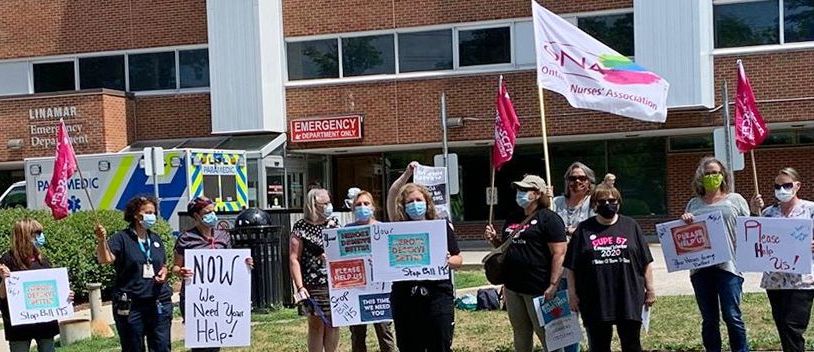
 Bill 195 will formally end the state of emergency but allows the emergency orders issued under the
Bill 195 will formally end the state of emergency but allows the emergency orders issued under the  "In
essence, Bill 195 would give the Premier and Ministers the power to
impose emergency orders that drastically curtail basic rights and
freedoms without the need to engage in the legislative process or
involve members of the Legislative Assembly," the CCLA said. It opposed
the fact that the special powers "would last for at least a year and
can be extended by the Legislative Assembly for a year at a time.
Indefinitely. The powers governments have under emergency legislation
are supposed to be exceptional -- Bill 195 would make the exercise of
those powers the 'new normal.'"
"In
essence, Bill 195 would give the Premier and Ministers the power to
impose emergency orders that drastically curtail basic rights and
freedoms without the need to engage in the legislative process or
involve members of the Legislative Assembly," the CCLA said. It opposed
the fact that the special powers "would last for at least a year and
can be extended by the Legislative Assembly for a year at a time.
Indefinitely. The powers governments have under emergency legislation
are supposed to be exceptional -- Bill 195 would make the exercise of
those powers the 'new normal.'" It
never was the case that the terms and conditions of work set out in
collective agreements put anyone at risk of "serious harm." Health care
professionals and workers from the outset have gone above and beyond
the call of duty, put their lives on the line, to care for the sick and
elderly. The working conditions of health professionals and
workers are in fact the living conditions of the elderly and those in
need of care in our society.
It
never was the case that the terms and conditions of work set out in
collective agreements put anyone at risk of "serious harm." Health care
professionals and workers from the outset have gone above and beyond
the call of duty, put their lives on the line, to care for the sick and
elderly. The working conditions of health professionals and
workers are in fact the living conditions of the elderly and those in
need of care in our society.
 "This
bill gives employers across the health care sector the right to act
unilaterally. An employer does not have to pay any attention to the
collective agreements that are in place. It can move you from your job
to another job, from the shift you are on to another shift. It can lay
you off without notice. It could bring in someone else to do your
work from outside. It could contract [out] that work. It could cancel
all leaves and vacations and of course one of the significant things is
it can do all that whether it has COVID cases or not. All of the health
care employers are empowered under this legislation to operate without
regarding the rights that exist in the contract even though most
hospitals and most long-term care facilities in Ontario have no COVID
cases. And this continues for a period of a year [and is] renewable --
could be two years, could be three years. What we have said to the
government is 'Look, if you have another outbreak of COVID, or Ebola or
typhoid, you've got to believe that, as we were in March, we
are going to be flexible. But setting permanent suspension of our
rights is not acceptable.'
"This
bill gives employers across the health care sector the right to act
unilaterally. An employer does not have to pay any attention to the
collective agreements that are in place. It can move you from your job
to another job, from the shift you are on to another shift. It can lay
you off without notice. It could bring in someone else to do your
work from outside. It could contract [out] that work. It could cancel
all leaves and vacations and of course one of the significant things is
it can do all that whether it has COVID cases or not. All of the health
care employers are empowered under this legislation to operate without
regarding the rights that exist in the contract even though most
hospitals and most long-term care facilities in Ontario have no COVID
cases. And this continues for a period of a year [and is] renewable --
could be two years, could be three years. What we have said to the
government is 'Look, if you have another outbreak of COVID, or Ebola or
typhoid, you've got to believe that, as we were in March, we
are going to be flexible. But setting permanent suspension of our
rights is not acceptable.'
 Benoît Taillefer:
First of all, I must say that I have absolutely no problem with people
coming to join us and that they are paid good wages. At the same time,
there are people who have been here for a long time, who see new people
coming in who have not had to do everything they did to become
full-time -- working days,
evenings, nights, having to be on-call seven days a week and so on. I'm
happy for the young people who are coming to work. I am less happy for
those who have fought for positions and who, after years, still do not
have access to full-time positions and feel they have been left behind.
Benoît Taillefer:
First of all, I must say that I have absolutely no problem with people
coming to join us and that they are paid good wages. At the same time,
there are people who have been here for a long time, who see new people
coming in who have not had to do everything they did to become
full-time -- working days,
evenings, nights, having to be on-call seven days a week and so on. I'm
happy for the young people who are coming to work. I am less happy for
those who have fought for positions and who, after years, still do not
have access to full-time positions and feel they have been left behind. BT:
The government is being politically opportunistic with its use of the
COVID-19 crisis. Ministerial orders are not an acceptable way of
governing. We have a collective agreement that has been negotiated and
signed in good faith. Now we have ministerial order after ministerial
order being imposed on us, violating our rights
and we do not have a say. I understand that we are in crisis and that
there are emergencies, but there are limits and they should not be
making our people sick. When you can no longer take summer vacations,
when people are exhausted, when there are health care workers who have
died in the field, and when more than 5,000 people have died
from COVID-19 in Quebec, many of them in long-term care centres, that
shows a total lack of recognition for workers. And yet the health care
workers are the ones who do the work and who unfortunately sometimes
die as a result. It is time government paid attention to our concerns
and demands, especially when it comes to our health and
safety. The government must stop passing ministerial orders and must
talk to the unions in good faith.
BT:
The government is being politically opportunistic with its use of the
COVID-19 crisis. Ministerial orders are not an acceptable way of
governing. We have a collective agreement that has been negotiated and
signed in good faith. Now we have ministerial order after ministerial
order being imposed on us, violating our rights
and we do not have a say. I understand that we are in crisis and that
there are emergencies, but there are limits and they should not be
making our people sick. When you can no longer take summer vacations,
when people are exhausted, when there are health care workers who have
died in the field, and when more than 5,000 people have died
from COVID-19 in Quebec, many of them in long-term care centres, that
shows a total lack of recognition for workers. And yet the health care
workers are the ones who do the work and who unfortunately sometimes
die as a result. It is time government paid attention to our concerns
and demands, especially when it comes to our health and
safety. The government must stop passing ministerial orders and must
talk to the unions in good faith.